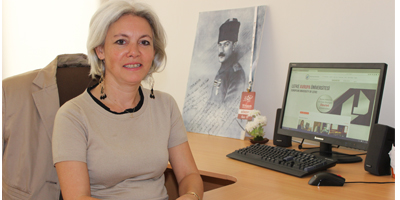“While the Covid-19 Outbreak increased the importance of New Media, it also created new challenges”

European University of Lefke (EUL) Faculty of Communication Sciences Head of New Media and Journalism Department Assoc. Prof. Dr. Elif Asude Tunca made a statement on “The Importance of New Media in the Covid-19 Outbreak”.
Tunca stated that the Covid-19 outbreak has greatly increased the use of new media tools and the prevalence of social media applications, but the increased news and message traffic creates new challenges for both senders and recievers.
Tunca said, “We are now in a new communication environment. There are some possibilities this gives us, but we cannot ignore the difficulties. People and institutions have to adapt themselves to this environment. “Both those who prepare and deliver the messages and those who are in the position of the recipients of the messages should try to increase the benefits they can get from this new environment by developing new behaviors.”
“With the replacement of face-to-face communication with remote communication during the epidemic process, interest in new media and social media applications increased, while the intensifying message traffic made it necessary to prepare more effective messages.”
Noting that due to the Covid-19 epidemic, not only young people, but also older people who “had to close their homes more” had to show interest in the new media, Tunca continued his statement as follows; “However, of course, the use of new media by young people has become more intense. We’ve all added new apps to the apps we use on our smartphones. Thus, we came to be the target of a much more intense message traffic. A constant state of communication emerged. In this case, sorting out the messages, arranging them in order of importance and acting accordingly also requires attention or effort. This situation has increased the difficulties we face as buyers. A new communication medium has emerged in which we need to pay more attention and effort ”.
Tunca said, “In this case, we will have to create a communication environment that we will create with our own conscious choices and we will not pay much attention to the rest,” and suggested that each individual should adopt a communication approach suitable for their lifestyle and goals as a way to get rid of this confusion.
Tunca said that the main difficulty faced by message senders is that “this complex communication environment emerging in terms of recipients must also be evaluated in terms of forwarders. The necessity of preparing the messages to be created towards the target with much greater care has emerged. Since you want to transmit a new message to the recipient who has to deal with hundreds of messages within a certain time frame, your message will need to have features that will distinguish it from others. Otherwise, the probability of getting lost in between has increased ”, she explained.
Emphasizing that in this case, it is important to prepare the messages in a much simpler language, without tiring the recipient, in a way that does not allow the message to be read or delayed, said Tunca, “Of course, this requires a better understanding of the target person, persons or institutions. He emphasized that their work did not get easier, on the contrary, it became difficult.
Tunca said, “We can briefly summarize it as follows: As the interest in new media and social media applications increased with the replacement of face-to-face communication during the epidemic process, the intensified message traffic made it necessary to prepare more effective messages. We should not think that our job has become easier. “A communication process that will be initiated by thinking like this will ultimately not produce the desired benefit, it will be experienced as a wrongly constructed process that makes things difficult.”
